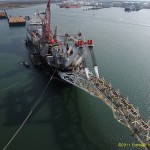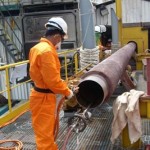 Offshore rig jobs are very hot right now, with many oil drilling companies ramping up their hiring to crew their new oil rigs. This is the best time for experienced offshore oil rig workers to get good deals, and for new starts to get into the oil industry. While it is relatively easy to get hired now, compared to 1998, you still should not take things for granted.
Offshore rig jobs are very hot right now, with many oil drilling companies ramping up their hiring to crew their new oil rigs. This is the best time for experienced offshore oil rig workers to get good deals, and for new starts to get into the oil industry. While it is relatively easy to get hired now, compared to 1998, you still should not take things for granted.
The first step to getting hired for an offshore rig job is to find out who is hiring and how to contact them. After that, you need to get the interview. This is where many candidates fall short. Most people tend to neglect their cover letter. Instead, they concentrate on their resume. While the resume is important, you should be aware that the first thing the company’s HR will see is your cover letter, not your resume. Below, I list 5 common mistakes candidates make in their cover letters.
1. No cover letter: Some candidates just send their resume without a cover letter. At best, they state that they are applying for a job at the top of their resume. While this may have worked 30 or 40 years ago, do note that many modern HR departments are staffed by college or university graduates with Human Resources certificates or degrees. These people expect to see a cover letter. If you do not provide them with what they want, they will immediately toss your application into the trash.
2. No subject: You need to state the job for which you are applying. This is especially important if you are sending your job application by email. Many email programs immediately delete your mail if you do not include a subject. The company’s HR staff won’t even know that your job application exists.
3. Inaccurate subject: Too many candidates just write “Looking for a job” or “Job application” in the subject of their cover letter. This is not good enough. You must state the actual job which you want. You must also state the reference number of the job posting made by the company. It is best to copy the exact words used by the company in the job posting in the subject of your cover letter.
4. Applying for more than one post: Some candidates try to hedge their bets by applying for more than one post at the same time. If you happen to be both a certified electrician and a certified mechanic, you may be tempted to apply for both jobs. In general, this is not a good idea. The HR department is usually understaffed and overworked. Their staff also have to classify the job applications they receive. If you apply for more than one job, they may choose to make their own lives simpler by trashing your job application or they may mis-file your application. Either way, this is not good for you.
5. Spelling and grammar mistakes: You do not need to be a grammar Nazi, but do proof-read your cover letter to make sure there are no major grammar errors. In addition, run your cover letter through the spell checker of a word processor like MS-Word before you send it out. You need to do this even if you are only applying for a job as a roustabout or roughneck. You need to show your prospective employer that you have the correct attitude – that you are reasonably careful. If you are careless with your cover letter, the manager will also expect you to be careless with the company’s equipment.
6. No contact info: This is a stupid mistake, but it can happen, especially if you are applying to companies both online and by post. It is very easy to get mixed up. If you send your job application by post, don’t forget to include your phone number, physical address and email address. Just because you could not find the company’s postal address or the company asked you to apply by post does not mean they do not want to contact you by email. Similarly, if you send your application by email, remember to include your physical postal address. Do also state the timezone you are in. This makes it easier for the company to phone you when necessary.
7. Talking about your own needs: Many candidates make this mistake. Your prospective boss does not care why you need or want this offshore rig job. Same goes for HR. What they care about is how you can help the company. You need to relate your previous experiences and accomplishments to the job requirements and responsibilities stated in the job posting.
These are 7 mistakes which can destroy your chances to get offshore rig jobs. Avoid these mistakes in your cover letter and you will greatly increase the chance that your resume will be read and that you will be asked for an interview.






